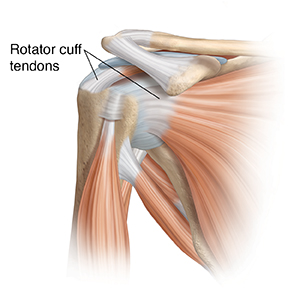Rotator Cuff Tendonitis for the Orthopedic Patient
Important information:
The shoulder is a complex joint. The interaction between the bones, cartilage, ligaments, muscle and tendon complex allows a wide range of motion and provides joint stability.
 |
© 2000-2024 Image used with permission from
The StayWell Company, LLC. |
The rotator cuff is a group of 4 muscles and tendons in the shoulder. Tendons connect muscles to bone. The 4 muscles and their tendons form a cuff around the head of the upper arm bone. The rotator cuff connects the upper arm to the shoulder blade. It keeps the shoulder joint stable and gives it strength. It also helps reach arms overhead and turning the arm.
What causes rotator cuff tendonitis?
-
Repetitive overhead activities or sports requiring overhead activity (swimming/baseball/tennis)
-
Acute injury to the shoulder (contusion, lifting strain, shoulder dislocation)
-
Loose ligaments (ligaments attach bone to bone)
-
Training errors
What are the symptoms of rotator cuff tendonitis?
-
Shoulder pain
-
Decreased shoulder movement and strength
-
Pain which worsens with overhead activities
-
Shoulder weakness
-
Difficulty in finding a comfortable sleeping position due to shoulder pain
What tests will be done?
Shoulder x-rays may be done. These x-rays will determine if there are any bone abnormalities and will also evaluate the shape and contour of the bones. If symptoms and physical exam indicate the need, an MRI might be done.
What is the recommended treatment?
Sometimes, an activity modification program is recommended to reduce your pain. A progressive exercise program is usually the main treatment. This program will focus on your individual strength and flexibility needs. The program's primary goal is to increase the strength and control of the rotator cuff muscles, specifically the internal and external rotator muscle groups. Physical therapy may be prescribed by your clinical team.
Is surgery necessary?
Surgery is not usually needed for this condition.
What else can I do?
When pain is present:
-
Focus on your strengthening activities
-
Decrease or stop any activities that aggravate the pain
-
Ice application or ice massage after sports or activities
Weekdays:
215-590-1527
Nights, weekends, and holidays:
Call 215-590-1000 and ask the operator to page the orthopedic resident on call.
Reviewed March 2024 by Meg Morro, RN